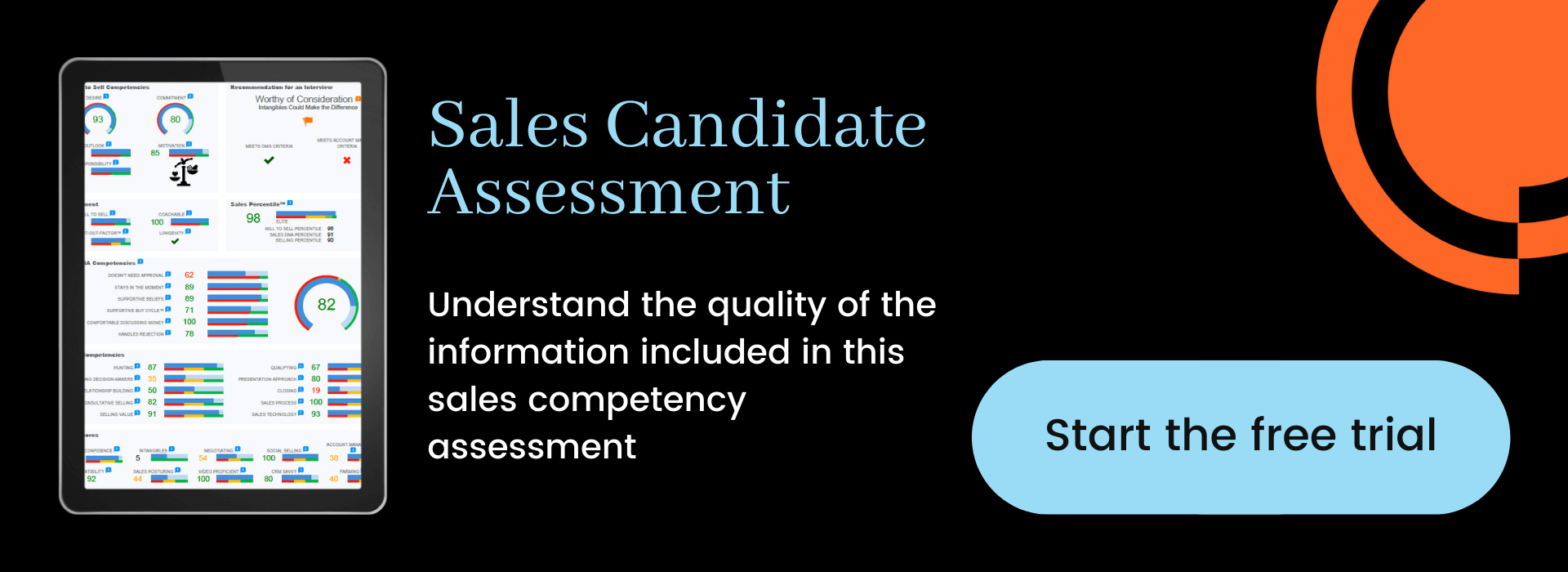
Prospecting is at the heart of the sales hunter job.
Unlike account managers and farmers, hunters focus most of their activities on acquiring new accounts. Their mission is to increase the company’s revenues with new business, so they’re an essential asset to any sales force.
In fact, great sales hunters can replace 50% of their customers, in a new sales territory, within 6 to 18 months depending on the length of your sales cycle.
Loving to prospect isn’t enough to be a top hunter. To be an elite sales hunter, the representative must possess several other complementary attributes.
With more than 1.8 million salespeople evaluated, Objective Management Group has determined that only 40% of reps are strong hunters. Sales leaders should understand that if a salesperson’s Sales DNA or Will to Sell doesn’t support hunting competencies, no amount of sales training will improve those skills.
Moreover, when recruiting a hunter, many business owners and sales leaders aren’t familiar with the attributes they should possess or the exact role they should play within the sales team.
Let’s look at 6 things related to hiring a great sales hunter:
- What’s a sales hunter?
- Sales hunter competencies
- The roles and responsibilities of hunters
- Can farmers be hunters?
- How to compensate sales hunters?
- How to motivate hunters?
What’s a sales hunter?
Sales hunters have the strong prospecting skills required to hunt regularly. They’re capable of reaching decision-makers and ask for introductions. They also have strong qualifying and closing skills.
Sales hunter competencies
- Prospects daily
- Keeps his/her sales funnel full
- Uses a variety of prospecting tools and techniques
- Doesn’t need approval
- Is rejection proof
- Isn’t a perfectionist
- Isn’t intimidated by decision-makers
- Consistently maintains a network of contacts
- Books appointments
Sales hunters prospect daily
Hunters enjoy prospecting, but they also consider it essential to allocate time to do it each day.
A hunter keeps his/her sales funnel full
Hunters should regularly feed their sales pipeline by booking meetings with prospects. New appointments are vital because good hunters also ensure that their pipeline is fresh by removing opportunities that aren’t qualified.
A hunter uses a variety of prospecting tools and techniques
Phone, email, sales automation tools, unannounced visits, LinkedIn prospecting: the hunter will vary his or her prospecting techniques to increase the number of conversations. They won’t hesitate to ask their network and customers for references and introductions.
A hunter doesn’t have a need for approval
A good hunter doesn’t need to be loved by his customers. Their primary motivation is to make sales, not friends.
A hunter manages rejection well
Hunters don’t let themselves be discouraged by rejection. They move on to the next call. They don’t systematically question themselves because they can distinguish the difference between their role as a salesperson and who they are outside of work. Moreover, their ability to properly manage rejection is part of their Sales DNA.
A hunter isn’t a perfectionist
A sales hunter wants to give his/her prospects to have a great experience, but he/she is more concerned about the number of prospecting calls made. They know that perfectionism often leads to procrastination.
A hunter isn’t intimidated by decision-makers
Hunters spend most of their time prospecting sales leaders, whether they are owners, CEOs, VPs, etc. They, therefore, need to have the confidence and posturing to talk to them. Also, they need to know how to identify and reach decision-makers.
A hunter constantly upkeeps his or her network
Good hunters ensure that their web presence, like their LinkedIn profiles, is always at its best and follow a social selling process. That being said, they place a lot of importance on face-to-face meetings and regularly attend networking events.
The roles and responsibilities of sales hunters
- Prospect daily
- Identify potential new customers
- Connect with key decision-makers
- Get meetings with prospects
- Qualify new business opportunities
- Close new sales
Responsibilities that are NOT the hunter’s responsibility
- Ensure the smooth delivery of orders
- Train customers on products or services
- Solve technical problems
Can farmers be hunters?
Instead of hiring, business and sales leaders dream of turning their farmers and account managers into hunters.
If that rings true to you, the most critical question to ask is: is it even possible?
This question is prevalent among business leaders and sales managers who want new accounts and want their sales team to find new customers. When that’s the case, it often means that they’re dealing with reps who are only comfortable working, meeting and talking with existing customers and who see complementary sales as a bonus.
When looking to increase prospecting efforts, the trap most business owners and executives fall in is to look at the sales compensation plan.
Compensation can help to get the hunter out of the account manager only when:
- They already have sales hunting competencies
- You invest in developing their hunter skills
- They understand the necessary level of activity
- You coach them regularly
How to compensate sales hunters
Although a change in comp plan may have an impact on performance with a small portion of their reps, money isn’t the primary reason why salespeople will chase new opportunities.
The compensation plan must be adjusted to increase a hunter’s motivation. For example, if you choose to assign accounts sold by the hunter to an account manager, Dave Kurlan offers the following compensation model:
The hunter receives a commission of xx% on new sales, then a small percentage of recurring revenue after the account has been given to the account manager. The manager should receive a base salary and a small percentage based on year-over-year growth.
How to motivate hunters?
Why do hunters stop hunting?
Even typical hunters, who pass sales candidate assessments with flying colours and who have a high proportion of the traits required for the role, can stop hunting.
There are a few reasons:
- Do they have the opportunity to focus on acquiring new customers? Are they busy with other tasks? In other words, is it a task assignment problem or a motivation problem?
- Do they want to prospect or only have the know-how to do so? There are three types of reps who have the skills and abilities to be good hunters:
- The ones that don’t like to prospect, but do it because, intellectually, they know it’s necessary to closing sales.
- The ones that are willing to prospect, but have to be held accountable to ensure that they solicit new potential customers on a constant basis.
- The ones that do it voluntarily and consistently. They’re the most autonomous because they fundamentally love it and will do it spontaneously and regularly.
Motivating sales hunters
It’s not because a rep can prospect, that they will. Like most humans, they’ll tend to choose the path of least resistance. So if it’s more lucrative to manage existing accounts than to hunt, they’ll prioritize the former.
Hunters put a lot of energy into prospecting. They need to manage a significant level of resistance when prospecting and are continuously rejected by prospects.
There are two elements to motivating sales hunters:
1. Clarify expectations
Is it clear that prospecting is a priority? Always set clear targets: Quantified expectations help both to clarify and motivate salespeople. KPIs help monitor prospecting activities.
2. Align compensation with objectives
The sales compensation plan is an incentive that encourages the required behavior. For example, if acquiring a new account gives a smaller percentage than upselling existing accounts, hunters will tend to prioritize activities that offer the best effort/reward ratio.
Conclusion
When a new salesperson doesn’t achieve the desired results or demonstrate the skills for which they were selected, you need to ask yourself if you are fostering the right environment for their success.
It’s normal to think that the candidates just aren’t cutting it, but as a sales leader, you have to look beyond that reflex and try to understand how your sales organization impacts success.
If one of your sales hunters stops hunting, some attributes are innate and more difficult to improve, while others are easier to correct. For example, it is easier to coach a representative on maintaining his or her network than to inspire them to love prospecting.






